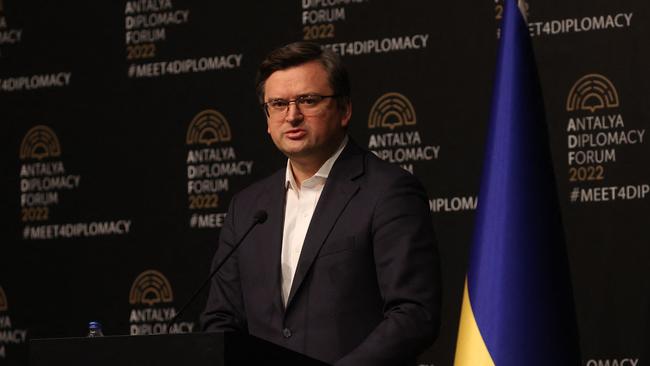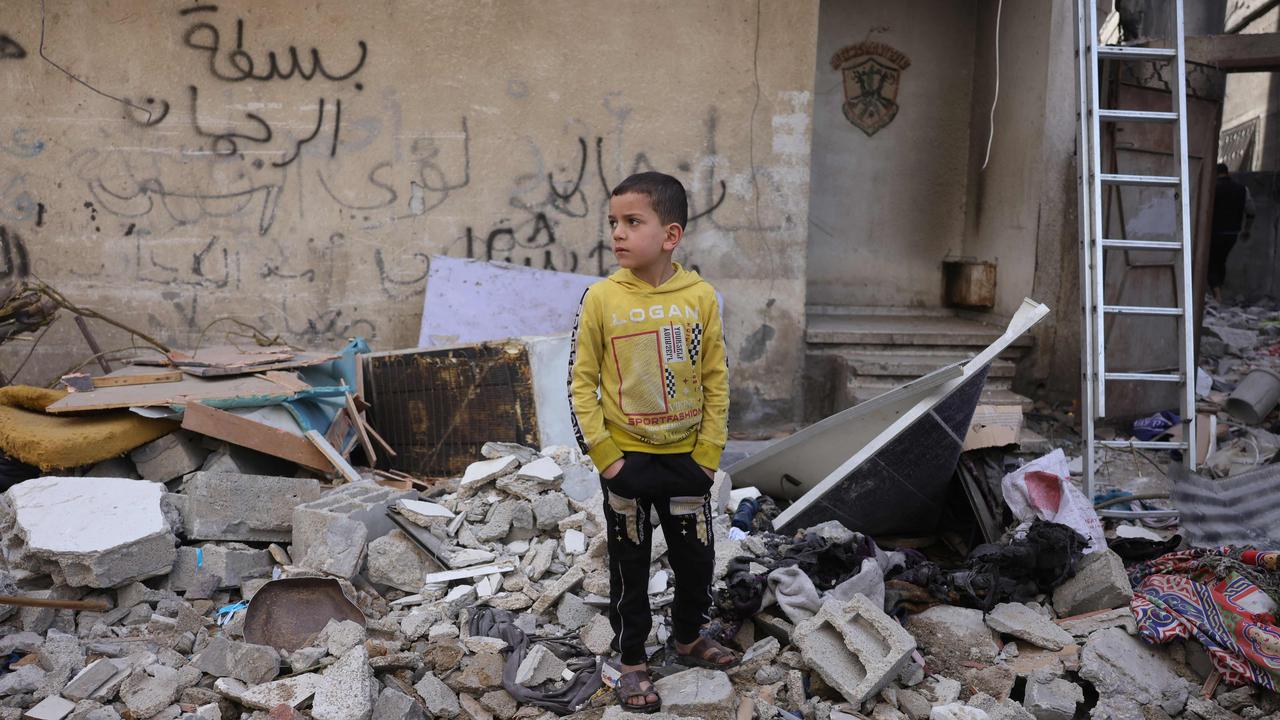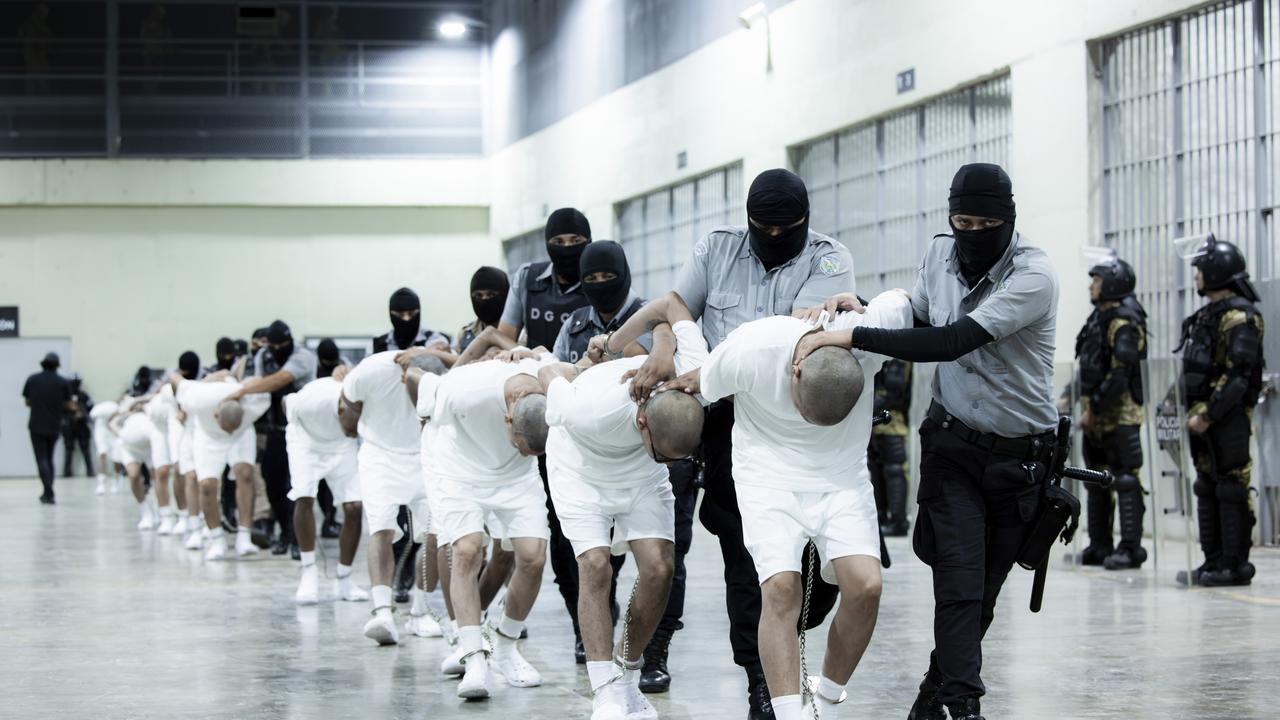Ukraine Foreign Minister Dmytro Kuleba accuses EU of backsliding
Ukraine Foreign Minister Dmytro Kuleba says his country needs more support.

The EU surprised the world – and itself – with its unified response after Vladimir Putin ordered his tanks into Ukraine on February 24.
Unprecedented sanctions and new security policies swiftly appeared. But as the war grinds into its second month and Russian missiles and shells continue to rain on Ukrainian cities, European resolve has begun to wane. That is the stark assessment of Ukraine Foreign Minister Dmytro Kuleba.
“What we saw in the beginning of the war was the rise of the European Union as a powerful player that can bring change,” Mr Kuleba said. “What I see in the last 10 days in the European Union is backsliding back to its normality where it cannot decide on strong and swift action.”
From an undisclosed location inside Ukraine, Mr Kuleba highlighted two trials facing his country: Russian aggression on one side, and Western hesitancy on the other. The stakes remain as existential as ever, despite Russia’s initial setbacks on the battlefield.
Russia’s shelling rings louder than its words. “There is no correlation between diplomatic dynamics and the dynamics on the battlefield,” Mr Kuleba said Ukraine’s ability to prevail against its larger neighbour rests on three pillars, he argues: Ukrainian stamina, weapons supplies and Western sanctions. “We always realised that there would be no country fighting shoulder to shoulder with us, that it would be the cross that we have to bear. But to help us, countries can do two things: send us necessary weapons and impose sanctions.”
Western sanctions have already made an impact. “Almost every 10th sentence [Russian negotiators] say is about sanctions,” Mr Kuleba said. “It’s a pain for them.”
But not yet painful enough. Many of the toughest-seeming measures have turned out to be what the minister calls “half-measures”. Russia’s disconnection from the SWIFT payment system has come with exemptions for a number of big banks; large European consumers of Russian energy insist that these are necessary for them to continue paying for their purchases. Sanctions intended to freeze Russian central bank reserves held overseas have come with carve-outs that have allowed Russia to continue paying off its debt and stave off technical default.
Ukraine’s wishlist for further sanctions begins with the closure of European ports to Russian ships and Russian goods. Ukraine has received “no clear explanation why this cannot be done”, Mr Kuleba claimed. It also includes an embargo on Russian oil and gas, or at the very least, visible, concrete steps towards reducing dependence on Russian energy sources. Finally, Ukraine would like the West to move beyond the practice of targeting individual oligarchs and towards a more systemic approach.
“You’re sanctioning Russian oligarchs, but Putinism is a system of governance,” Mr Kuleba argued. “They may not be billionaires or even millionaires but they are the small elements in the machine of Putinism.” Yet calls for each of these steps have started to meet resistance in certain corners of Europe. “Unfortunately I have observed in the last 10 days a certain sanctions fatigue in some European countries.”
A similar dynamic has taken hold in talks about weapons supplies, according to the Foreign Minister. Western arms, in particular shipments of anti-tank and anti-aircraft missiles from America (they are brought in by land, mostly across the border with Poland), have made a big difference so far. But Ukraine’s Western partners remain hesitant to send bigger-ticket items such as tanks, armoured vehicles or planes.
Ukraine sees Western governments’ worries about moving beyond what they call defensive weapons systems as dawdling over semantics. “Every weapon that is being used by the Ukrainian army in the territory of Ukraine is a defensive weapon by definition,” Mr Kuleba argued. “Those who make up these artificial divisions in their minds – we can give this, but we cannot give that – they only extend the suffering of Ukrainians, they contribute to the toll of dead civilians, and they only facilitate the further destruction of Ukrainian cities and villages.”
Ongoing negotiations between Russia and Ukraine have produced no sign so far that Russia intends to cease the destruction until it has achieved its aims. “I’m not overly optimistic about the way these talks are going,” Mr Kuleba said. Though Turkish and Israeli interlocutors have hailed purported progress in bringing the two sides closer to a compromise, Mr Kuleba sees little substantive change in Russia’s position. “They’re not as confident and self-assured as they used to be in the first days … but on all big issues they are still where they were [when the negotiations began].”
Other senior Ukrainian officials question whether their Russian counterparts are sincere about the talks. “Moscow has always used peace talks to manipulate the agenda,” one senior intelligence officer says. “Just as they have accused us of bombing our own people and homes.”
Russia’s representatives may lack information about the true state of their military losses; they may also reckon the situation is evolving in the right direction for them, despite the early difficulties, particularly around the capital, Kyiv. Ukraine has lost control of its Azov Sea coast. The big port city of Mariupol now seems to be on the verge of falling.
The shape of any potential settlement remains elusive. Ukraine has stated publicly that it will make no concessions on territorial integrity, including over Russian-annexed Crimea and the parts of the Donbas region in eastern Ukraine that have been occupied by Russian-backed forces since 2014.
Behind closed doors there appears to be more willingness to experiment with different formulas. Yet any solution that leaves territory in Russian control would come with grave risks. “
In 2014-15, troops stayed behind in the Donbas despite the peace agreements,” says Oleksandr Martynenko, a Ukrainian journalist and former senior official. “Now the stakes are higher, and we are talking about Kyiv, Kharkiv, and Mariupol.”
The second big sticking point revolves around new security guarantees for Ukraine. The Russians dispatched to the negotiating table do not appear empowered to resolve such questions, Mr Kuleba said.
Direct negotiations between Mr Putin and Ukraine President Volodymyr Zelensky are “the only real talks where decisions can be made,” he said. Mr Zelensky has called on the results of any negotiation to be put to a referendum.
For Ukraine, the aim of both the fighting and the talking is to ensure its continued development as a European, democratic country. Yet stopping that is exactly what Mr Putin most desires. His goal is not simply to capture territory, it is to eradicate Ukraine’s democratic political culture, Mr Kuleba reckons: “Putin’s plan remains the same. He literally doesn’t recognise the right of Ukraine to exist.”
Whether the Russian dictator succeeds in snuffing out Ukraine will depend not just on Ukrainians’ astonishing courage, which is not in doubt, but on the West’s continued determination to give it the help that it sorely needs. And that, so it seems in Ukraine, is much less certain.
The Economist



To join the conversation, please log in. Don't have an account? Register
Join the conversation, you are commenting as Logout